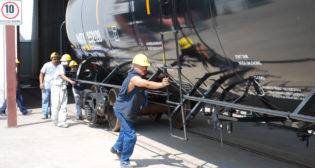
Rep. Lipinski introduces new freight research legislation
Written by Carolina Worrell, Senior EditorAddressing the need for increased national freight research, U.S. Representative Dan Lipinski (D-Ill.) introduced on June 29, 2015 legislation aimed at improving freight mobility through transportation research and strategic planning.
H.R. 2886, or the Future Transportation Research and Innovation for Prosperity (TRIP) Act, was introduced “to support innovative technologies that have the potential to fundamentally alter mobility in America and beyond,” and calls for the establishment of a pilot program to evaluate freight fluidity measures as well as a national cooperative freight transportation research program.
“Surface transportation used to be rather staid and unimaginative, but today the very concept of ‘mobility’ is being reinvented through research, innovation and entrepreneurship,” said Rep. Lipinski. “Rapidly advancing automation, connectivity and information technologies are creating incredible opportunities for transportation innovation. We need to develop innovative ways to improve safety, ease congestion, improve personal mobility and cut energy use. As a member of the Transportation and Infrastructure Committee, as well as the Ranking Member on the Research and Technology Subcommittee of the Science, Space, and Technology Committee, I am working to ensure that we are developing these technologies effectively in the United States.”
The Future TRIP Act would: · Establish priorities for research and deployment of technologies for connected and autonomous vehicles that promise to make commutes safer and more efficient
· Improve transportation research at universities by removing burdensome restrictions on grant applicants and increasing the focus on multimodal research which universities are uniquely positioned to conduct
· Direct the Office of Science and Technology Policy to lead a comprehensive cross-agency coordination effort on transportation research
· Invest in pavement research to reduce costs, increase performance, and increase the use of recycled materials
· Bolster technology transfer and innovation in transportation by removing restrictions on researcher travel and recognizing outstanding innovators
· Direct the Department of Transportation (DOT) to identify gaps in current data collection, improve freight data, and provide important ethical safeguards for data collection, storage, and dissemination
· Instruct DOT to create a strategic research plan to improve efficiency and safety of freight transportation, and focus resources on top priorities
· Support research to test ground-based, satellite, and unmanned aerial systems’ (UAS) ability to help solve multimodal transportation challenges and improve safety
· Establish an Intelligent Transportation Systems Center of Excellence to improve sharing of best practices, training, and technical assistance for this challenging interdisciplinary field.
· Provide considerations to improve future Strategic Research, Development, and Technology plans based on critiques from the National Academies, including communicating the value of the research and identifying potential and ongoing intermodal and interagency collaborations
“Congressman Lipinski has been a steadfast freight advocate and his continued leadership is appreciated by the Coalition for America’s Gateways and Trade Corridors,” CAGTC said. “We commend his efforts to develop legislation that encompasses both strategic freight planning and research, and also considers input from a broad spectrum of stakeholders. A well-functioning freight transportation system, based on sound research, is vital to our national economic prosperity. We look forward to continued work with the Congressman, knowing that like our Coalition, he understands the importance of addressing emerging and future research needs related to improving our multimodal goods movement system.”
“We cannot allow the U.S. to fall behind on advanced transportation technologies,” Lipinski added. “We must strive to be proactive, not reactive, in regard to transportation innovation. It is important for industry and government to work together to accelerate implementation and maximize the societal benefits of these technologies.”



